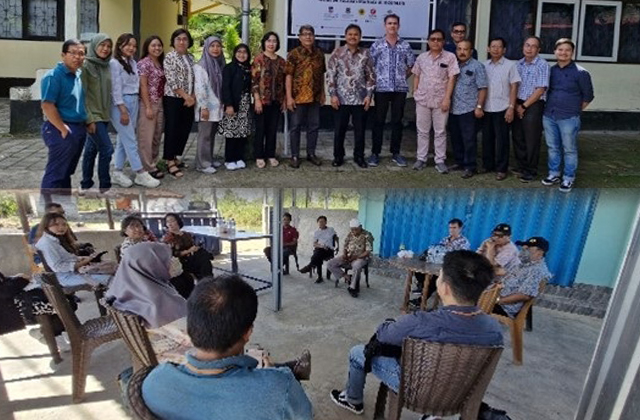ACIAR Unram Activity: Engaging Smallholders in the Value Chain of Agricultural Products to Horeca

Mataram, University of Mataram – Australia’s research cooperation agency for agriculture, the Australian Center for International Agricultural Research (ACIAR), has strengthened cooperation with research institutions in Indonesia. One of the latest collaborations is through the Agriculture for Tourism (Ag4T) program focused on NTB, Bali, and North Sulawesi.
In this program, ACIAR collaborates with University of Mataram (Unram), Udayana University (Unud), Sam Ratulangi University (Unsrat), University of Adelaide Australia, and the National Research and Innovation Agency (BRIN).
On May 13, 2024, the ACIAR team discussed the operational plan for the next five years, prepared an instrument in the form of a questionnaire or list of questions to be tested on the horeca, farmers and In-chain in the value chain of agricultural products that support horeca development. In this case, the horeca fully supported this activity by providing their time to accept the ACIAR team to interview them. Horeca also committed to continue creating an agricultural product value chain that benefits all parties.
Then, on May 14, 2024, the ACIAR team continued the field survey to Rinjani Lodge Hotel in Senaru and farmlands in KLU, to conduct a pilot test of the questionnaire to hotel managers, horticultural producers, restaurant owners, restaurant managers and also to traders who supply agricultural products to hotels, all of them from KLU. In his interview, one of the suppliers of agricultural products confirmed that North Lombok Regency desperately needs this program and the presence of this program will greatly help agricultural activists.
On May 15, 2024, the ACIAR team held a reflection discussion on the results of the questionnaire pilot test in North Lombok, with more detailed activities planned for June, July and August 2024. In June the ACIAR team will complete the data collection survey for horeca, then in July a workshop will be held with horeca managers to identify problems faced by horeca in purchasing agricultural products including beef and chicken to determine which horeca managers can be included in the ACIAR activity team. In August, a data collection survey will be conducted for farmer producers and in-chain actors.
In the final session of the discussion, the Rector of Unram, Prof. Ir. Bambang Hari Kusumo, M.Agr.St., Ph.D. conveyed the direction that this cooperation activity was a great opportunity for Unram to be able to synergize some of its superior programs, as an effort to involve itself in improving an atmosphere based on equitable values.
In the afternoon, the ACIAR team from Unram, Unud, Unsrat, BRIN and Adelaide Uni visited the Cattle Corporation Village program breeder group and the Mandalika Baren Sampi Breeder Cooperative in Teruwai Village. At the end of this visit, the ACIAR team was allowed to visit the Mandalika Circuit Area which was received by the circuit management.
The Ag4T ACIAR Unram team consists of Prof. Sri Widyastuti (Faculty of Food Technology and Agroindustry); Prof. Dr. Ir. Sukartono, M.Agr. (Faculty of Agriculture); Prof. Dahlanuddin (Faculty of Animal Science); Dr. IGL Parta Tanaya (Faculty of Agriculture); Prof. Bambang Sayaka (BRIN); Dr. Tanda Panjaitan (BRIN); Dr. Nurul Hilmiati (BRIN). Nurul Hilmiati (BRIN); Putu Ciska, SE, M.Si. (PO Unud); Bryan Stevy, MBA (PO Unram); Dr. Franciska (Unsrat); Dr. Tati Djarkasi (Unsrat); Agnes, SE, M.Sc. (PO Unsrat); Dr. Jeremy Badgery Parker (University of Adelaide); Prof. Made Suparta Utama (Unud); Dr. Ngurah Arya (Unud); and Mariatul Quro, SP. as admin.
With a multidisciplinary team, ACIAR’s Ag4T team will be responsible for the implementation of the program. They will work together with various relevant parties to achieve the program’s big goals over the next five years, from 2023 to 2028.
It is hoped that this collaboration will have a significant impact on the development of the agriculture and tourism sectors in NTB, as well as improving the welfare of the local community.
